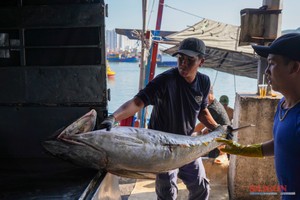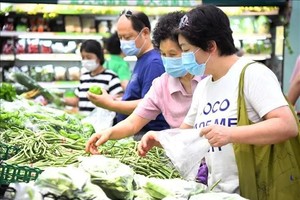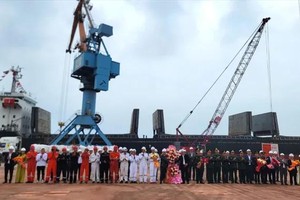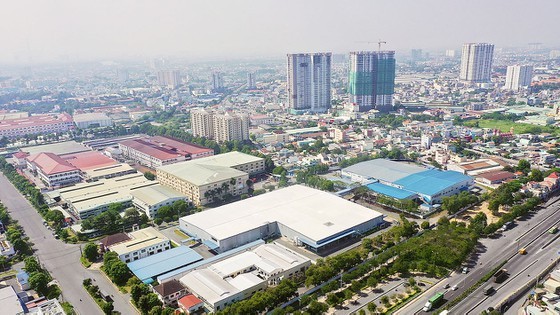 Linh Trung Export Processing Zone increases FDI attraction in the first three months of 2021. (Photo: SGGP)
Linh Trung Export Processing Zone increases FDI attraction in the first three months of 2021. (Photo: SGGP)
Total investment capital does not decrease
Regarding foreign direct investment (FDI) activities in Vietnam, statistics in the first eight months of 2021 show that the number of newly- licensed FDI projects is 1,135, much lower than the same period last year. The total number of new FDI projects accounts for about 63.2 percent of that in the same period in 2020. However, there are still positive signs for the economy when the total value of FDI capital in Vietnam by August reaches US$19.12 billion, approximately that in the same period last year.
Besides, starting from March, the total value of new FDI capital each month has been higher than the same period last year. It shows that foreign investors still have high expectations for Vietnam's investment environment, although there are serious Covid-19 outbreaks at this time. In Ho Chi Minh City, new FDI projects continued to increase slightly in the last three months.
As for the registered capital of FDI projects, statistics show that in the first eight months of 2021, Long An took the lead, and HCMC ranked second with a total registered capital of nearly $2.2 billion, accounting for 11.4 percent of the total investment capital, followed by Binh Duong, Can Tho, Hai Phong, and Hanoi. Thus, the impact of the outbreak of the Covid-19 pandemic in Southern provinces does not change the tendency of choosing investment areas because of certain advantages in industrial and technical infrastructure. Regarding capital adjustment activities, by the end of August, the country had about 639 projects adjusted capital for a total of $4.98 billion. In HCMC, there were 117 times of capital adjustment with additional capital of $647.3 million, down 40.6 percent in the number of licenses, but increased by 54.4 percent in the value of registered capital compared to the same period last year.
However, it is necessary to acknowledge that the number of FDI projects with adjusted capital does not decrease, but the ratio of the capital increase is extremely low. For instance, although South Korea has the highest new FDI project among countries investing in Vietnam, the capital adjustment ratio started to slow down from March 2021. This trend is similar to the capital adjustment activities of FDI investors in HCMC in recent months. FDI investors continue to explore in the context that many provinces and cities have not returned to the new normal. With fierce competition in FDI attraction in the region and the world, if the new normal is slow, the opportunity to attract FDI for economic recovery and development will lose.
It is forecasted that in the last months of 2021 and early 2022, the ability to attract FDI capital of Vietnam will depend on the results of the Covid-19 pandemic prevention and control. The economy will be affected by the efficiency of FDI activities when domestic enterprises are still facing many difficulties.
Taking advantage of FTAs
To attract FDI capital, HCMC in particular and the country, in general, must have effective solutions in pandemic prevention, which is the foundation for rebuilding a stable and safe investment environment and is a prerequisite for maintaining and attracting FDI capital into Vietnam.
Regarding foreign direct investment (FDI) activities in Vietnam, statistics in the first eight months of 2021 show that the number of newly- licensed FDI projects is 1,135, much lower than the same period last year. The total number of new FDI projects accounts for about 63.2 percent of that in the same period in 2020. However, there are still positive signs for the economy when the total value of FDI capital in Vietnam by August reaches US$19.12 billion, approximately that in the same period last year.
Besides, starting from March, the total value of new FDI capital each month has been higher than the same period last year. It shows that foreign investors still have high expectations for Vietnam's investment environment, although there are serious Covid-19 outbreaks at this time. In Ho Chi Minh City, new FDI projects continued to increase slightly in the last three months.
As for the registered capital of FDI projects, statistics show that in the first eight months of 2021, Long An took the lead, and HCMC ranked second with a total registered capital of nearly $2.2 billion, accounting for 11.4 percent of the total investment capital, followed by Binh Duong, Can Tho, Hai Phong, and Hanoi. Thus, the impact of the outbreak of the Covid-19 pandemic in Southern provinces does not change the tendency of choosing investment areas because of certain advantages in industrial and technical infrastructure. Regarding capital adjustment activities, by the end of August, the country had about 639 projects adjusted capital for a total of $4.98 billion. In HCMC, there were 117 times of capital adjustment with additional capital of $647.3 million, down 40.6 percent in the number of licenses, but increased by 54.4 percent in the value of registered capital compared to the same period last year.
However, it is necessary to acknowledge that the number of FDI projects with adjusted capital does not decrease, but the ratio of the capital increase is extremely low. For instance, although South Korea has the highest new FDI project among countries investing in Vietnam, the capital adjustment ratio started to slow down from March 2021. This trend is similar to the capital adjustment activities of FDI investors in HCMC in recent months. FDI investors continue to explore in the context that many provinces and cities have not returned to the new normal. With fierce competition in FDI attraction in the region and the world, if the new normal is slow, the opportunity to attract FDI for economic recovery and development will lose.
It is forecasted that in the last months of 2021 and early 2022, the ability to attract FDI capital of Vietnam will depend on the results of the Covid-19 pandemic prevention and control. The economy will be affected by the efficiency of FDI activities when domestic enterprises are still facing many difficulties.
Taking advantage of FTAs
To attract FDI capital, HCMC in particular and the country, in general, must have effective solutions in pandemic prevention, which is the foundation for rebuilding a stable and safe investment environment and is a prerequisite for maintaining and attracting FDI capital into Vietnam.
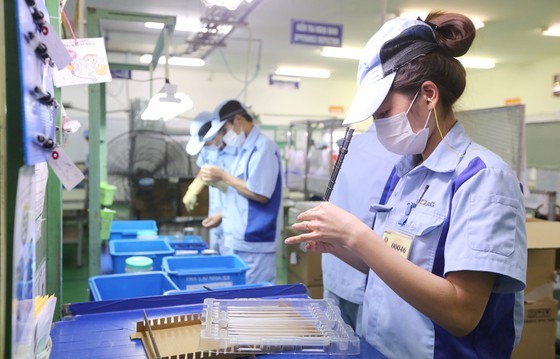 Production at a Japanese company in Quang Minh Industrial Park in Me Linh District in Hanoi. (Photo: SGGP)
Production at a Japanese company in Quang Minh Industrial Park in Me Linh District in Hanoi. (Photo: SGGP)
At present, businesses are longing for the Government and local authorities to immediately implement policies to encourage domestic enterprises by support packages to restore business operations, production, and commercial and service activities. Promoting public investment through infrastructure, industrial, urban areas, and technology projects is also a way to attract domestic and foreign investors. In the medium and long run, it is necessary to develop policies to improve domestic enterprises, creating a solid potential foundation to promote the internal resources of the domestic economy. This direction aims to create proactiveness and better response to the complicated developments of the world economy and other uncertainties. Vietnam has many advantages as the country has signed many Free Trade Agreements (FTAs). Switching to the new normal, the implementation of these FTAs need to be promoted to boost export activities, thereby gradually recovering the economy. It is necessary to create favorable conditions for overseas Vietnamese, especially overseas Vietnamese entrepreneurs and intellectuals, to return home to invest, produce, and do business, contributing actively to the construction and protection of the Fatherland. The authorities should focus on policy dialogue and on-the-spot investment promotion and grasp the situation to take timely and appropriate measures to remove difficulties for FDI enterprises, especially in administrative procedures, land, human resources, and raw materials and components. Along with that, authorities should make the investment and business environment transparent and create the best conditions for foreign investors to research and carry out projects. In the context of difficult travel between countries due to the impact of the pandemic, it is necessary to replace direct investment promotion with its online counterpart to limit the risk of spreading the disease and save costs. Investment promotion should be organized in the direction of proactively approaching, understanding, and supporting partners and large corporations to explore investment opportunities in Vietnam and focusing on investment promotion in traditional markets, such as South Korea, Thailand, Japan, Hong Kong (China), Singapore, the US, and Europe. At the same time, the country should prepare conditions ready to welcome investment waves.
